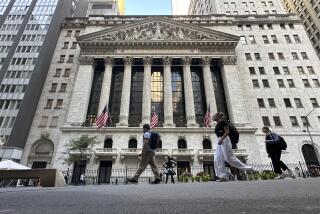Consumer Confidence Shaken in July
- Share via
U.S. consumer confidence took a surprise spill in July as worries over rising unemployment took a heavy toll, the Conference Board reported Tuesday.
The private research group’s monthly consumer confidence index slid to 76.6 in July from 83.5 in June. That was the lowest reading since March, when the attack on Iraq was in full swing, and confounded analysts, who had looked for an improvement to 85.
“It’s a bit of a disappointment, like two steps forward and one step back,” said Jim O’Sullivan, an economist at UBS. “People are obviously concerned about jobs.”
Consumers describing jobs as “hard to get” rose to 33.1% in July from 31.9% in June, its highest level since January 1994. That mirrored the national unemployment rate, which jumped to 6.4% in June, also a nine-year high.
Jobs figures for July are due Friday, and the confidence survey could dent hopes that payrolls will show the first rise in five months. The labor market has stayed stubbornly depressed, even though other recent indicators have shown some life stirring in the economy.
“It doesn’t change the overall impression that the economy’s getting better. Rather, it’s a reminder that people shouldn’t get too carried away with expectations for the scale of the recovery,” O’Sullivan said.
The Conference Board’s expectations index slumped to 86.4 from 96.4, while the present-situation index fell to 61.9 from 64.2, the group said.
“The rising level of unemployment and sentiment that a turnaround in labor market conditions is not around the corner have contributed to deflating consumers’ spirits this month,” said Lynn Franco, director of the Conference Board’s Consumer Research Center.
“Expectations are likely to remain weak until the job market becomes more favorable,” Franco added.
This month, the University of Michigan’s survey of consumers found a slight improvement in July, with its sentiment index rising to 90.3 from 89.7 in June.
Analysts noted that in recent years, there has been little correlation between what consumers have told surveys and what they actually have done with their money. Even the gloomiest responses have not stopped people from buying cars and homes at a record pace.
Two reports on U.S. chain-store sales released Tuesday showed some slackening in demand last week. But spending was still at its best pace since the Easter-assisted strength of April.
More to Read
Inside the business of entertainment
The Wide Shot brings you news, analysis and insights on everything from streaming wars to production — and what it all means for the future.
You may occasionally receive promotional content from the Los Angeles Times.










